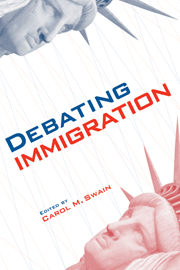Book contents
- Frontmatter
- Contents
- About the Contributors
- Preface
- Acknowledgments
- 1 Introduction
- PART I PHILOSOPHY AND RELIGION
- 2 The Disconnect between Public Attitudes and Policy Outcomes in Immigration
- 3 Carved from the Inside Out
- 4 A Biblical Perspective on Immigration Policy
- 5 The Moral Dilemma of U.S. Immigration Policy
- PART II LAW AND POLICY
- PART III ECONOMICS AND DEMOGRAPHICS
- PART IV RACE
- PART V COSMOPOLITANISM
- PART VI CONCLUSION
- Notes
- Index
3 - Carved from the Inside Out
Immigration and America's Public Philosophy of Citizenship
Published online by Cambridge University Press: 05 June 2012
- Frontmatter
- Contents
- About the Contributors
- Preface
- Acknowledgments
- 1 Introduction
- PART I PHILOSOPHY AND RELIGION
- 2 The Disconnect between Public Attitudes and Policy Outcomes in Immigration
- 3 Carved from the Inside Out
- 4 A Biblical Perspective on Immigration Policy
- 5 The Moral Dilemma of U.S. Immigration Policy
- PART II LAW AND POLICY
- PART III ECONOMICS AND DEMOGRAPHICS
- PART IV RACE
- PART V COSMOPOLITANISM
- PART VI CONCLUSION
- Notes
- Index
Summary
During the second session of the 109th Congress, bitter debate broke out about how many guestworker immigrants we should admit within our borders and under what conditions they may remain here. Should they receive permission to stay permanently? That immigration should be the topic of raging debate is unsurprising. What is surprising is that it is taking place only now, two and a half immigration-laden centuries after the founding of our nation. Immigration has shaped us as a country in manifold ways, and yet it can hardly be said that at any point in the United States' history we – as a nation-state, as a republic, or as a people – have shaped immigration. Why is it that subjects as basic as the status of children born on American soil to undocumented immigrants or the fairness of guestworker programs have received sustained national attention only recently?
Despite its lengthy history as an immigrant-receiving nation, the United States has as yet failed to produce a well-articulated public philosophy of immigration. Many European nations, most of which have been the recipients of large-scale immigration for less than half a century, seem as well or even better equipped than the United States to answer these questions through a coherent public philosophy of immigration. This leaves 21st-century Americans in the position of trying to extract a reasoned set of policies to govern the border from a relatively shallow well of precedent and philosophy.
- Type
- Chapter
- Information
- Debating Immigration , pp. 32 - 45Publisher: Cambridge University PressPrint publication year: 2007
- 1
- Cited by



